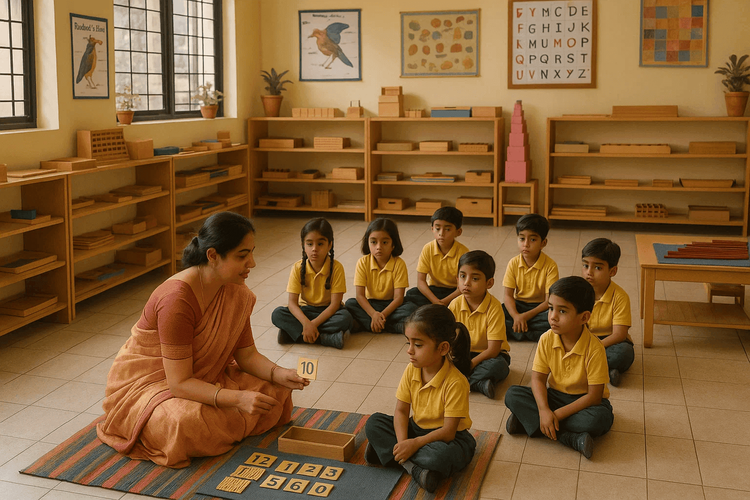Montessori vs Traditional Schools | PlanetSpark Creative Writing

Table of Contents
- History and Background of the Montessori Method
- How Montessori Schools Differ from Conventional Study Centre
- Why Parents Prefer Montessori Over Conventional Schools
- Drawbacks of Montessori Schools
- Montessori vs Traditional Schools: Pros and Cons
- PlanetSpark: Building Creative Thinkers and Confident Commun
- Conclusion
Choosing the right school or daycare for your child is one of the most important decisions parents face. With countless options in every city, it can feel overwhelming to identify the environment where your child will thrive both academically and emotionally. Traditional schools and daycare centres often emphasize structured learning, but many parents today are looking for something more holistic, where curiosity, independence, and creativity are at the core. This is where Montessori schools stand out, offering an approach that values the individuality of each child while fostering self-sufficiency and lifelong learning skills.
Alongside formal schooling, extracurricular programs play an equally important role in shaping a child’s communication and creative abilities. At PlanetSpark, children explore Creative Writing Courses that empower them to express ideas with confidence and imagination. These courses are designed to develop writing, storytelling, and communication skills in a structured yet fun manner. With personalized guidance and engaging tools, PlanetSpark ensures that kids don’t just learn to write, they learn to think critically, narrate confidently, and express themselves with clarity.
History and Background of the Montessori Method
The Montessori method of teaching was developed by Dr. Maria Montessori, an Italian physician and educator, in the early 1900s. Initially trained as a doctor, Maria Montessori worked extensively with children who had learning difficulties. She observed that when given freedom, structure, and the right materials, these children showed remarkable progress in their ability to learn and engage with the world.
In 1907, she opened her first classroom called the Casa dei Bambini (Children’s House) in Rome. Here, she introduced an innovative approach to education that emphasized independence, hands-on learning, and respect for a child’s natural psychological development. Instead of rigid instruction, Montessori encouraged self-directed activity, where children chose tasks based on their interests and learned at their own pace.
The Montessori method was built on three key principles:
Prepared Environment: A carefully designed learning space that supports exploration and discovery.
Auto-Education: The belief that children learn best when they educate themselves through experience and curiosity.
Role of the Teacher: Teachers serve as guides and observers rather than traditional instructors.
Over time, the Montessori approach spread globally and was adapted across cultures and age groups. Today, there are thousands of Montessori schools worldwide, recognized for fostering independence, creativity, problem-solving, and a lifelong love for learning.

How Montessori Schools Differ from Conventional Study Centres
When parents compare Montessori schools with conventional schools, the differences go far beyond teaching methods. Montessori institutions are built on principles of independence, freedom within limits, and respect for a child’s natural development. Instead of rigid classroom setups where the teacher leads and students follow, Montessori classrooms encourage exploration and self-directed learning.
Children Are Seen as Unique Individuals
In Montessori schools, every child is recognized as a unique learner with their own pace, personality, and strengths. Teachers observe students closely to tailor lessons that suit their developmental stage. For instance, one child may show an early interest in numbers while another thrives in language activities. Montessori educators adapt accordingly, ensuring no child feels left behind.
Conventional schools, on the other hand, often group children and teach them the same material, expecting uniform results. While efficient for large classrooms, this approach can leave slower learners struggling and advanced learners feeling unchallenged.
Facilitating Self-Sufficiency
Independence is one of the strongest values of Montessori education. Children are encouraged to perform everyday tasks themselves, tying shoelaces, arranging their learning materials, or cleaning up after activities. These small responsibilities build confidence and resilience, teaching kids that they are capable of managing their world.
In contrast, traditional schools frequently emphasize dependence on teachers for instructions and solutions. While structure is important, too much reliance can reduce opportunities for self-discovery and problem-solving. Montessori schools flip this model, encouraging children to take ownership of their learning journey.
Learning Becomes Engaging and Fun
One of the biggest challenges in education is keeping children genuinely interested. Conventional systems often rely on rote memorization, standardized tests, and repetitive assignments. While this may work for basic academic milestones, it rarely sparks curiosity or creativity.
Montessori classrooms, however, integrate hands-on learning with real-world applications. For example, a lesson on fractions may involve dividing fruits or baking bread rather than simply writing equations on a board. By connecting concepts to everyday life, children not only understand better but also enjoy the process of learning.
Teachers as Guides, Not Instructors
In Montessori schools, teachers take on the role of facilitators or guides. They don’t stand in front of the class delivering lectures. Instead, they move around, observing, assisting, and offering personalized feedback. The emphasis is on nurturing curiosity rather than enforcing compliance.
This differs greatly from traditional classrooms where teachers are authoritative figures. While discipline and structure are essential, a more collaborative approach creates a safe space for children to ask questions, experiment, and learn through trial and error.
Why Parents Prefer Montessori Over Conventional Schools
Respect for Individual Pace
Each child develops at a different rate, and Montessori schools honor this fact. A five-year-old struggling with writing won’t be forced to match the pace of peers but will instead receive supportive guidance tailored to their readiness.
Development Beyond Academics
Montessori focuses on emotional, social, and physical growth alongside academics. Group activities teach teamwork, while independent projects encourage decision-making.
Lifelong Skills
The goal isn’t just passing exams but nurturing skills like critical thinking, communication, and adaptability, qualities children carry into adulthood.
Give your child the confidence to write, speak, and express ideas clearly with PlanetSpark.
Drawbacks of Montessori Schools
While Montessori offers unique benefits, it’s not without challenges. Some children may find it difficult to transition into traditional schooling systems later due to differences in teaching styles. Additionally, the strong emphasis on independence may sometimes reduce opportunities for peer collaboration compared to group-oriented conventional setups. Parents should weigh these factors when making a choice.
Limited Structure for Some Learners
Not every child thrives in an open-ended environment. Some students need a more structured, step-by-step approach to feel secure and focused. The Montessori method’s flexibility, while beneficial for many, can sometimes overwhelm children who prefer clear rules and boundaries.
Fewer Opportunities for Standardized Testing Preparation
Since Montessori schools emphasize self-paced learning and hands-on exploration, they may not focus as heavily on standardized testing formats. This can create challenges for children when transitioning to conventional schools or applying to institutions where test performance is a major criterion.
Higher Costs Compared to Traditional Schools
Many Montessori schools are privately run and may have higher tuition fees than public schools or conventional daycare centers. This makes them less accessible to some families, limiting the widespread adoption of the method despite its proven benefits.
Teacher Training and Quality Variability
Montessori teachers require specialized training, and the quality of implementation can vary significantly between schools. In some cases, schools may label themselves as “Montessori” without fully adhering to authentic principles, which can affect the consistency of a child’s educational experience.

Potential Social Gaps
While independence is strongly encouraged, group projects and teamwork are less emphasized in some Montessori environments. This could lead to fewer opportunities for children to develop collaborative skills at an early stage compared to conventional classrooms, where teamwork is a regular part of learning.
By considering these drawbacks alongside the many advantages, parents can make a more informed decision about whether Montessori is the right fit for their child’s needs and long-term goals.
Montessori vs Traditional Schools: Pros and Cons
To help parents make an informed choice, here’s a quick comparison of Montessori and conventional schooling approaches:
| Feature | Montessori Schools | Traditional Schools |
|---|---|---|
| Learning Approach | Self-directed, hands-on, activity-based | Teacher-led, curriculum-based, rote learning |
| Individual Attention | Personalized guidance, paced learning | Standardized instruction for groups |
| Teacher Role | Guide and mentor | Instructor and authority figure |
| Social Interaction | Independent learning emphasized, mixed-age groups | Group activities focused, same-age classes |
| Assessment | Observation-based, progress tracking | Grades, tests, exams |
| Flexibility | Encourages exploration and curiosity | Structured syllabus with fixed schedule |
| Skill Development | Creativity, critical thinking, self-sufficiency | Academic performance, discipline |
PlanetSpark: Building Creative Thinkers and Confident Communicators
While Montessori schools focus on nurturing independence and holistic growth, extracurricular platforms like PlanetSpark complement that journey by sharpening essential 21st-century skills.
Features of PlanetSpark’s Creative Writing and Communication Courses
1. 1:1 Personal Trainers for Every Child
Certified experts provide personalized live coaching tailored to each child’s strengths and weaknesses.
2. Personalised Curriculum and Learning Roadmap
Customized learning journeys ensure progress in grammar, vocabulary, storytelling, and public speaking.
3. SparkX – AI-Enabled Video Analysis
Smart evaluations of voice clarity, confidence, and stage presence help track measurable improvement.
4. AI-Led Practice Sessions
Virtual AI coaches simulate real-time speaking and storytelling practice.
5. Spark Diary
A digital journaling tool that builds writing consistency and expressive confidence.
6. Gamified Learning
Quizzes, challenges, and competitions make grammar and vocabulary fun.
7. Structured Parent-Teacher Meetings
Regular updates and collaborative plans ensure transparent progress tracking.
8. Comprehensive Progress Reports
Detailed evaluations covering content, grammar, delivery, and confidence.
9. Exclusive Clubs and Communities
Debate, story writing, podcasting, and poetry clubs encourage teamwork and creativity.
10. Sparkline: Safe Sharing Platform
A secure space for kids to showcase work and interact with peers.
11. Contests and Showcases
Regular competitions and talent shows boost motivation and recognition.
12. SparkBee and SparkShop
Daily practice quizzes and engaging eBooks enhance core language skills.
Together, these features ensure that children don’t just learn to write and speak; they become confident storytellers, creative thinkers, and impactful communicators.
Conclusion
Montessori schools have earned their reputation as a nurturing alternative to conventional education, giving children the space to grow as individuals while developing independence and curiosity. Parents who value holistic development often choose Montessori for the foundation it provides. At the same time, additional platforms like PlanetSpark amplify these efforts by offering structured, personalized programs in creative writing, communication, and public speaking.
In today’s world, it isn’t enough for children to simply perform well in academics; they must also be confident communicators, innovative thinkers, and expressive writers. Montessori and PlanetSpark together provide the perfect blend of self-discovery and skill-building, setting children up for long-term success.
Frequently Asked Questions
Montessori schools view mistakes as part of the learning journey. Teachers encourage children to self-correct, whereas traditional schools often highlight errors through grades and rewards.
Yes, because teachers stay with the same group of children for multiple years, allowing deeper relationships and personalized support.
Montessori schools focus on social, emotional, cognitive, and physical aspects equally, making children independent, empathetic, and confident.
While they appear more flexible, Montessori classrooms follow a well-defined structure based on activities, independence, and guided exploration.
Children may face challenges transitioning to traditional systems later, and the independence-based approach may sometimes reduce peer bonding.
PlanetSpark adds structured skill-building in areas like writing, storytelling, and communication, ensuring children grow academically and creatively.
Absolutely. With 1:1 coaching, AI-based feedback, and supportive clubs, even introverted kids gain confidence to express themselves clearly.
Personalized Communication Report
Record a video to get a AI generated personalized communication report for your child

Hi There, want to try these
tips for your child with
LIVE with our expert coach?
Let's check your child's
English fluency
